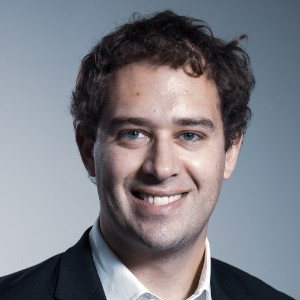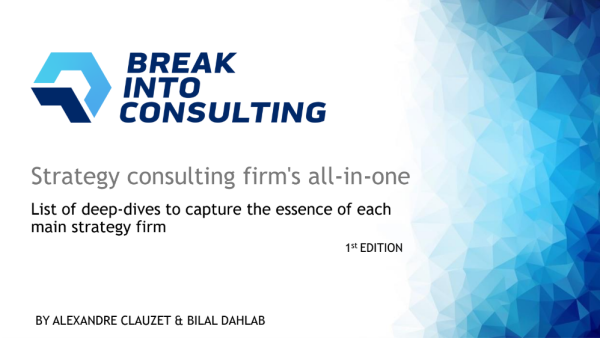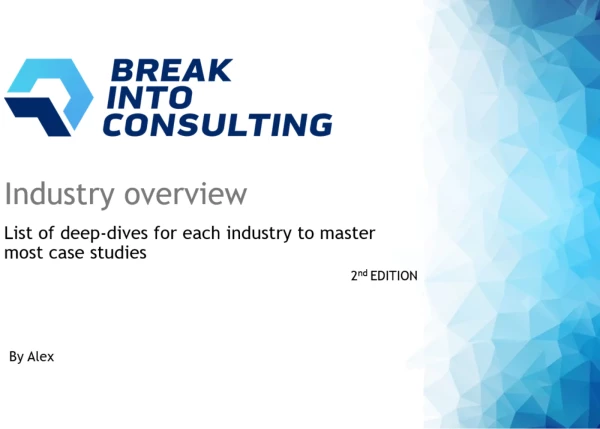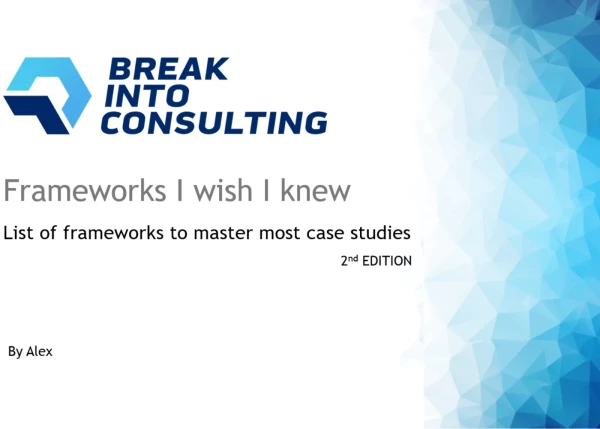Dear PrepLounge,
Happy Holidays! Throughout casing practice, I regularly get feedback on things like:
- “Oh, you need to do fast mental math or else you won't pass”
- “Oh, you didn't mention this one specific risk or example in your brainstorming, and this is critical otherwise you won't pass”
- “Oh, you took too long in structuring, you need to be faster”
How much of this are myths and how much of this are actual MBB evaluation criteria? For example, isn't the case essentially a simulation of a consultant-client conversation? In such cases, shouldn't the purpose of the math section be to clearly and steadily guide the client through the quants so they will give buy-in? Similarly, isn't it more important to come up with a rigorous problem-solving logic then trying to be fast to impress the client?
Get Active in Our Amazing Community of Over 452,000 Peers!
Actual Evaluation Criteria vs Hearsay/Myth
Overview of answers
'Give your candidate as much time and opportunity as they need to express their best performance" is what is said in MBB guidelines at the bottomline. Others are BS.
As far as you are perform an energetic dialogue of consultant-client type being structured, top-down (= prioritising), fairly fast, smart & creative you are totally good. On average no interviewer has their intention to make it harder for you but clearly you'd be always ready to share your structure with no time given to prepare it, or quickly come up with an approach, or generate 10 ideas on the fly, etc.
(edited)
Hello,
Here are my thoughts:
1) The bar to get into MBB is very high. You are expected to be logical, clear, MECE and fast.
2) However, there are some trade-offs that you can make:
a) In a brainstorming question, you should ask the interviewer for 30 seconds to structure your thoughts. If they allow it, great! You now have 30 seconds and you SHOULD come up with structured ideas in MECE buckets.
However, if they say do not allow you time to think, then it's not always expected that you come up with MECE buckets. But what they expect from you in clear, concise, bullet points atleast.
b) In quant, typically they give you a reasonable amount of time to do the math (mentally or on paper). But in my personal example, in my BCG Final round interview, the interviewer asked me if I could do the math in < 30 seconds! Obviously, there was a shortcut that he wanted me to spot.
3) In a nut shell, It's better to ask for more time and be right, than to do it quickly and make a blunder. But if you do it right and quickly - that separates you from your competition :)
Hope this helps!
Feel free to reach out to me directly if you have any questions.
Rushabh
You may benefit from coaching to get an evaluation as close to the real thing as possible. To answer you:
“Oh, you need to do fast mental math or else you won't pass”
You won't get bonus points if you are super quick with fast math. Fast mental math is only useful to spend more of your time on (1) giving insights from your analysis and (2) exploring more of your issue tree. “Fast” is relative but if you take more than 3 seconds to do 20*42, you need to practice some drills.
“Oh, you didn't mention this one specific risk or example in your brainstorming, and this is critical otherwise you won't pass”
Sounds like a myth but it depends on the case. If you structure is MECE you are fine. Of course, if you miss cost from a profitability framework you are not going to pass.
“Oh, you took too long in structuring, you need to be faster”
First round you should be aiming for a 90sec structure. I know of some final rounds where you don't get structuring time and dig right in. If it takes you regularly over 2 mins to structure (you are doing structuring drills, right?), you need to do more drills.
Hi there,
This is indeed an interesting question which is probably relevant for a lot of users, thus I am happy to provide my perspective on it:
- It's important to keep in mind that consulting case interviews are designed to simulate the types of challenges that consultants encounter on the job, and to assess your fit for a consulting role. With that in mind, it can be challenging to get a sense of how well you are performing in these interviews without the perspective of someone who has firsthand experience interviewing candidates for strategy consulting roles.
- In order to get an accurate assessment of your performance, it may be helpful to work with a coach who has experience in this area, or to seek feedback from a friend who works in strategy consulting. These individuals will be able to provide you with specific, targeted feedback that is based on the expectations and evaluation criteria of actual consulting firms.
In case you want a more detailed discussion on what to do in your specific situation, please feel free to contact me directly.
Best,
Hagen
Hey there,
Great question! I remember the days when I was in your position and had to deal with all this nonsense. Actual interviewers only have a handful of criteria and none of them have anything to do with what peers will typically make you believe.
What peers fail to do is distinguish personality and behaviors from actual skills, which is all that interviewers care about (at least for the case portion of the interview, setting aside fit for a moment).
You will not find the transparency you're looking for here in the forum but coaching will help you a great deal. I just wrote a comprehensive guide on exactly this topic for McKinsey applicants, which I share with all my coachees - please get in touch if you want to learn more.
Best of luck!
Moritz
Hi there,
Sounds like pretty classic feedback from peer casers - hence the value in investing in professional coaching!
Unfortunately, a lot of peer-to-peer feedback is heresay, or nuanced to a degree that your partner can't differentiate for you. The general rule is exactly what you've said: “what would be good versus bad in a roleplay where I am the consultant and they are the client”. However, ultimately, only coaching can separate the heresay from the real.
Hi! Very clear answer:
- “Oh, you need to do fast mental math or else you won't pass”
- “Oh, you didn't mention this one specific risk or example in your brainstorming, and this is critical otherwise you won't pass”
- “Oh, you took too long in structuring, you need to be faster”
All of this (really, ALL of this!) is only repeated and passed on by people who have NOT been trained as interviewers in MBB. Period. This has nothing to do with the actual evaluation of candidates. It is stuff that has been made up by the early “gurus” who wrote books on case interview preparation - but if you check their profiles you realize that they were far too junior to be formally trained as interviewers during their tenure. I won't state any names here, but the facts are clear.
Following these early books/resources, these myths have been ever-repeated by candidates - and also by junior consultants who received entered MBB, and who BELIEVED that they received offers because of these beliefs (even though in reality it was oftentimes DESPITE these beliefs).
The flip side of the coin is that gettig guidance form someone who was actually trained as an interviewer within MBB is still an enormous competitive advantage against the 99% of candidates who are constantly sabotaging themselves simply by chasing myths.
Cheers, Sidi
_______________________
Dr. Sidi Koné
(Former Senior Engagement Manager and Interviewer at McKinsey | Former Senior Consultant and Interviewer at BCG)
Hi there,
Your last paragraph is totally spot-on. The interview is indeed meant to simulate a conversation. What is important is not speed, but the connection you have with the interviewer, how structured you are in your thinking and how well you manage to lead through the case.
You're getting this sort of feedback because I assume you're mostly doing peer training. Peer training is great but at some point it hits a ceiling and (this is going to sound like a plug) then it's worth in getting more expert support to have a clear perspective of where you are and what is the remaining gap you need to close. Look for a coach, perhaps speak to several to figure out which one is good for you and try at least a session to get an assessment of readiness. This should also give you a better base on how to take the feedback from peers going forward.
Best,
Cristian
Hello!
It would be actually a great prep material> a sheet with the classical myths about consulting and which ones are and aren't true! Of the ones you mention, what I can tell you is that being strong with math (and yes, mental math) is key.
Hope it helps!
Cheers,
Clara
It is always good if the case interview feels like an actual conversation / discussion with your interviewer. In order for that to happen, a great deal of what you have described in your last paragraph needs to happen.
Robustness in your mental math is needed for credibility. It's important to get the numbers right but it doesn't matter if it takes you 5 seconds or 10 second usually (especially not when you keep the flow of the conversation going). If it takes you a minute or longer (for the sake of an example), then the interviewer might have some doubts regarding your analytical skills and usually keeps on probing in that area.
Sounds like you have done plenty of peer-to-peer mock cases. Might be a good idea to do one with a coach for a spot check to get some targeted feedback with proper context








I've passed and is starting next month. A few of my interviews barely had 30 seconds of thinking before they wanted my structure and the same for my quants
This is just emulating an impatient client. If the interviewer sees that you then start getting nervous and blurting out unfinished / wrong thoughts, this will massively work against you. What will work in your favor is showing the maturity to either take the room for a well-substantiated answer ("I believe there are a couple of different angles which are very relevant here - so if it is okay for you I would just take a couple more seconds to provide a robust perspective for our client? Or would you rather want me to share the status quo - then we can jointly polish it?"), or you embrace the fact that your thinking is still "work in progress" ("I have a few aspects to discuss, however there is certainly more to go through. So let met start by sharing with you my initial thoughts, and then we can enrich this together."). This is how you sound like a consultant, and not like a student in an oral exam. :) _______________________ Dr. Sidi Koné (Former Senior Engagement Manager and Interviewer at McKinsey | Former Senior Consultant and Interviewer at BCG)
(edited)